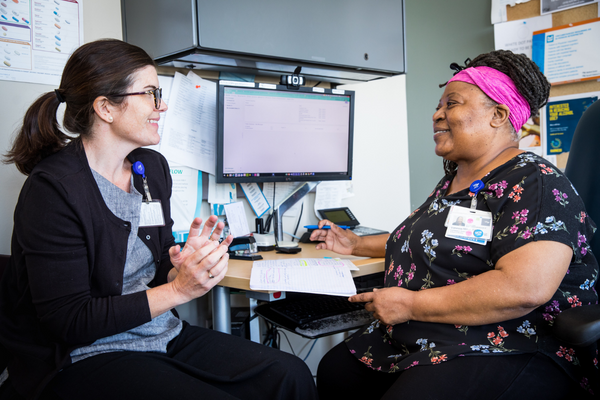
By Tatum Lyles Flick
Communications Specialist
Vanderbilt University School of Nursing PhD student Rosalind de Lisser, FNP, PMHNP, studies how psychological safety and the work environment affect nurse practitioner burnout.
“With more than 270,000 NPs in the county and over 40,000 new NPs joining the workforce every year, we are becoming a vital and important part of the primary care workforce,” de Lisser said, adding that more than 50 percent experience burnout and 45 percent do not feel valued in the workplace, which can lead to negative patient outcomes, job dissatisfaction and turnover.
De Lisser hopes to impact workplace burnout and plans to use her dissertation research to inform future policy and development of workplace interventions that promote well-being.
“To make well-being a priority in the work environment, we as a society need to embrace fiscal models of reimbursement, which prioritize health care worker well-being as an indicator of quality,” de Lisser said, adding that clinicians may feel pressure under current models of reimbursement and the exponential burden of medical text messaging which is often not billable. “This begins with revisioning environments where care is received and elevating models of care which prioritize well-being in the workplace for all health workers.”
De Lisser is a psychiatric and family NP with 22 years of experience, and an associate clinical professor at the Betty Irene Moore School of Nursing at University of California, Davis and at the University of California, San Francisco School of Nursing and Medicine. Throughout her career, de Lisser has mentored students, new clinicians and faculty, and learned from working with others and from her own experience how burnout can adversely affect people, patients and the workplace.
“Burnout hits at the very core of who you are as a health care professional,” de Lisser said. “It shakes your identity and sense of professional competency and can be devastating.”
De Lisser’s years of experience helped her understand where doctoral research could make a difference. She chose VUSN for her PhD in Nursing Science because of a scholarship and because “the online/immersive curriculum allowed me to continue to work.”
She also appreciates VUSN’s attention to inclusivity, “I am a PhD student with a disability and I hope to become more involved with VUSN and their inclusive teaching and learning practices.”
De Lisser’s research is funded by a VICTR award from Vanderbilt University Medical Center, a SARA award from Vanderbilt School of Nursing, and a grant the California Health Care Foundation.
Learn more about the VUSN PhD in Nursing Science here >>
